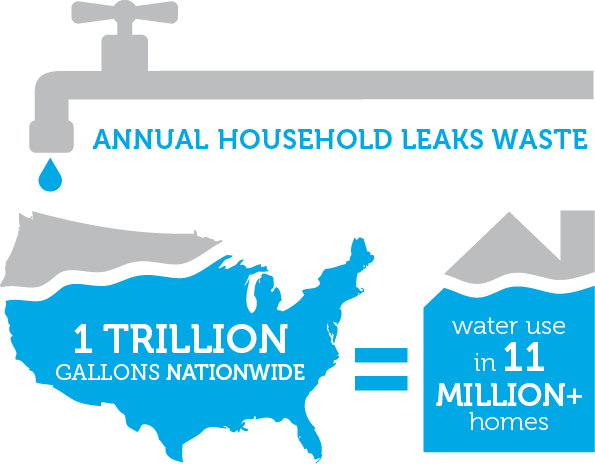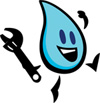Fixing Leaks Around the Home
Being handy around the house doesn't have to be difficult. Common types of leaks found in the home are worn toilet flappers, dripping faucets, and other leaking valves. These types of leaks are often easily correctable, requiring only a few tools and hardware that can pay for themselves in water savings.

Repare goteos y fugas alrededor del hogar (En Español)

Checking for Leaks
To check for leaks in your home, you first need to determine whether you're wasting water. Then identify the source of the leak.
- Take a look at your water usage during a colder month, such as January or February. If a family of four exceeds 12,000 gallons per month, there are serious leaks.
- Check your water meter before and after a two-hour period when no water is being used. If the meter changes at all, you probably have a leak.
- Identify toilet leaks by placing a drop of food coloring in the toilet tank. If any color shows up in the bowl after 10 minutes, you have a leak. (Be sure to flush immediately after the experiment to avoid staining the tank.)
- Examine faucet gaskets and pipe fittings for any water on the outside of the pipe to check for surface leaks.
- The Regional Water Providers Consortium has a video on detecting household leaks
 that you may find helpful.
that you may find helpful.
Toilets
A common reason why toilets will leak is an old or worn–out toilet flapper (e.g., valve seal). Flappers are inexpensive rubber parts that can build up minerals or decay over time. Replacing them can be a quick and easy fix for your water woes. To fix this leak, consult your local hardware store, home improvement retailer, or licensed plumber. Here are some online resources from WaterSense partners:
- Spartanburg Water has a useful video tutorial on detecting leaky toilets
 .
. - The Regional Water Providers Consortium has a step-by-step video on how to fix a leaky toilet
 .
.
Tip: Bring the old flapper to the hardware store for comparison to make sure you buy a new flapper that fits your toilet model. You can also check the owner's manual, if you have it, or the manufacturer's website for the appropriate replacement part number for the flapper.
Faucets
Old and worn faucet washers and gaskets frequently cause leaks in faucets. Many tutorials are available online for how to fix a wide variety of faucets. Here are a couple of examples:
- The Do-It-Yourself Network has a handy reference on faucet repairs
 .
. - YouTube has numerous video tutorials on how to fix a dripping faucet
 .
.
Tip: Don't forget to turn off the water line before you start!
Showerheads
Some leaky showerheads can be fixed by making sure there is a tight connection between the showerhead and the pipe stem and by using pipe tape to secure it. Pipe tape, also called Teflon tape, is available at most hardware stores, is easy to apply, and can help tame unruly leaks. For more complicated valve leaks in showers that drip when not in use, contact an experienced handyperson or licensed plumber.
Tip: It's also a good idea to check and, if needed, replace the washer or "o" ring inside the showerhead while making this repair.
Outdoors
If you have an in–ground irrigation system, check it each spring before use to make sure it wasn’t damaged by frost or freezing. Or hire an irrigation professional certified by a WaterSense labeled program to inspect it for you. These professionals have passed a certification program focused on water efficiency. They will not only help you detect and correct leaks in the system, but also maximize its efficiency.
Finally, check your garden hose for leaks at its connection to the spigot. If it leaks while you run your hose, replace the nylon or rubber hose washer and ensure a tight connection to the spigot using pipe tape and a wrench.
Leaks Still Flowing Overboard?
Have you done all that you can to try to eliminate leaks from your home but still can't nip that drip in the bud?
If you've already determined you have leaks and you find these step-by-step solutions aren't enough to stop them, it might be time to replace your leaking fixtures. If you consult with a plumbing professional, and look for the WaterSense label when considering a new toilet, faucet, or showerhead, you could increase your home's water efficiency.




